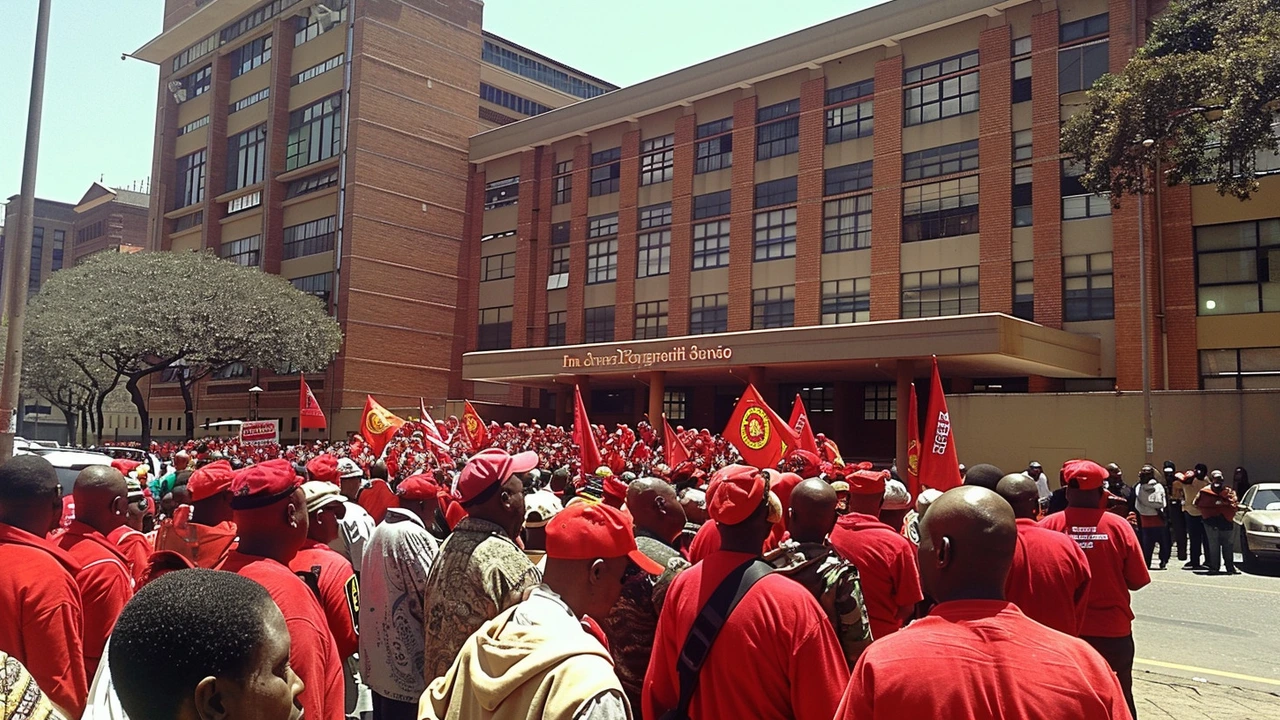Marshall Dlamini, currently serving as the Secretary General of the Economic Freedom Fighters (EFF), will keep his seat in the South African Parliament. This decision comes despite his recent sentence of 18 months' imprisonment, suspended for five years. Dlamini also faces a fine of R6,000 for malicious damage to property. The sentencing follows a 2019 incident in which Dlamini assaulted a police officer during the State of the Nation Address. This development has sparked discussions about the legal nuances and political implications of his continued presence in the National Assembly.
The backdrop of Dlamini's situation is a legal technicality in the South African Constitution. Specifically, Section 47(e) of the Constitution states that persons sentenced to more than 12 months of imprisonment without the option of a fine are considered ineligible for parliamentary membership. In Dlamini's case, the imposed fine has provided a crucial loophole, allowing him to maintain his position as an MP. The EFF has confirmed that Dlamini will continue his parliamentary duties and leadership role within the party, emphasizing that the fine ensures his eligibility remains intact.
This sentencing and subsequent retention of his parliamentary seat arrive at a time of heightened political activity in South Africa, with various parties preparing for upcoming elections. The EFF, known for its vigorous and sometimes controversial political stance, has rallied behind Dlamini. They insist that his continued role is essential for furthering the party's agenda and representing their constituents effectively. Dlamini's ability to navigate this legal challenge further underscores his significance within the EFF and the broader political landscape.
The 2019 assault incident, which has now culminated in this sentence, involved a heated altercation between Dlamini and a police officer. It occurred during a highly charged political environment and was widely covered by the media, drawing both criticism and support from various quarters. The handling of Dlamini's case has been closely observed by legal experts, political analysts, and the public alike. It has highlighted the complexities involved in balancing legal regulations with political realities.
Critics of the EFF have not been silent regarding the outcome of Dlamini's case. Some argue that the fine undermines the seriousness of the crime and sets a concerning precedent. They contend that elected officials should be held to the highest standards of conduct and accountability. According to these critics, Dlamini's continued participation in parliamentary activities may cast a shadow on the institution's integrity. They call for stricter enforcement of eligibility criteria and more robust oversight mechanisms to ensure public trust in the legislative process.
On the other hand, supporters of Dlamini and the EFF argue that the sentence, being suspended, reflects a fair balance between punishment and the opportunity for rehabilitation. They point to Dlamini's record of service and his commitment to the party's goals as justification for his continued role. These supporters believe that the presence of experienced leaders like Dlamini is indispensable, especially as the country navigates complex socio-economic challenges. They hold that focusing on his contributions to the political discourse rather than his past actions will benefit the democratic process.
The case also raises broader questions about the relationship between criminal justice and political representation. It forces a re-examination of how legal judgments can intersect with elected responsibilities. This debate is not unique to South Africa, as many democracies worldwide grapple with similar issues. The intersection of law and politics often reveals tensions that must be addressed through ongoing dialogue and policy considerations.
Implications for the EFF and South African Politics
The EFF's decision to stand by Dlamini amidst this controversy reflects its strategic priorities. By retaining Dlamini, the party signals its resolve to defy critics and maintain unity within its leadership ranks. This move could be seen as an attempt to consolidate power and present a united front, particularly as political campaigns intensify. The EFF's messaging around Dlamini's role is likely to emphasize resilience and commitment to their political mission.
For the broader South African political environment, Dlamini's case sets a significant precedent. It illustrates how legal outcomes can influence political dynamics and vice versa. Observers will be keen to see if such cases prompt legislative reviews or calls for constitutional amendments. The clarity and enforcement of eligibility criteria will remain a focal point for debate, shaping future political discourse and policy formulation.
In understanding the full impact of Dlamini's sentence and his continued parliamentary role, one must consider the diverse viewpoints within South African society. The public's reaction, the media's portrayal, and the responses from various political actors collectively paint a complex picture. Moving forward, the dialogue surrounding this case will likely influence how similar situations are handled, both in legal and political contexts.
Public Reaction and Media Coverage
The public's reaction to Dlamini's sentencing has been mixed. Some citizens express frustration and concern over what they perceive as leniency towards public officials. These individuals argue that more stringent measures are necessary to uphold justice and deterrent against misconduct. Conversely, others believe that the fine and suspended sentence are proportionate, recognizing the unique pressures faced by political figures.
Media coverage of the incident and its aftermath has been extensive and varied in tone. Certain outlets have focused on the legal aspects and procedural fairness of Dlamini's sentence, while others have highlighted the potential political ramifications. This diversity in reporting reflects the multifaceted nature of the case and its wide-reaching implications. As news stories continue to develop, public opinion may be further influenced by ongoing investigative journalism and commentary.
Ultimately, Marshall Dlamini's case serves as a crucial point of reference for understanding the interplay between legal accountability and political leadership in South Africa. As discussions evolve, both within the halls of Parliament and across the broader public sphere, the outcomes will shape the country's democratic trajectory and governance practices. The EFF's stance and Dlamini's actions in the coming months will provide further insights into how political parties and their members navigate such contentious issues.






